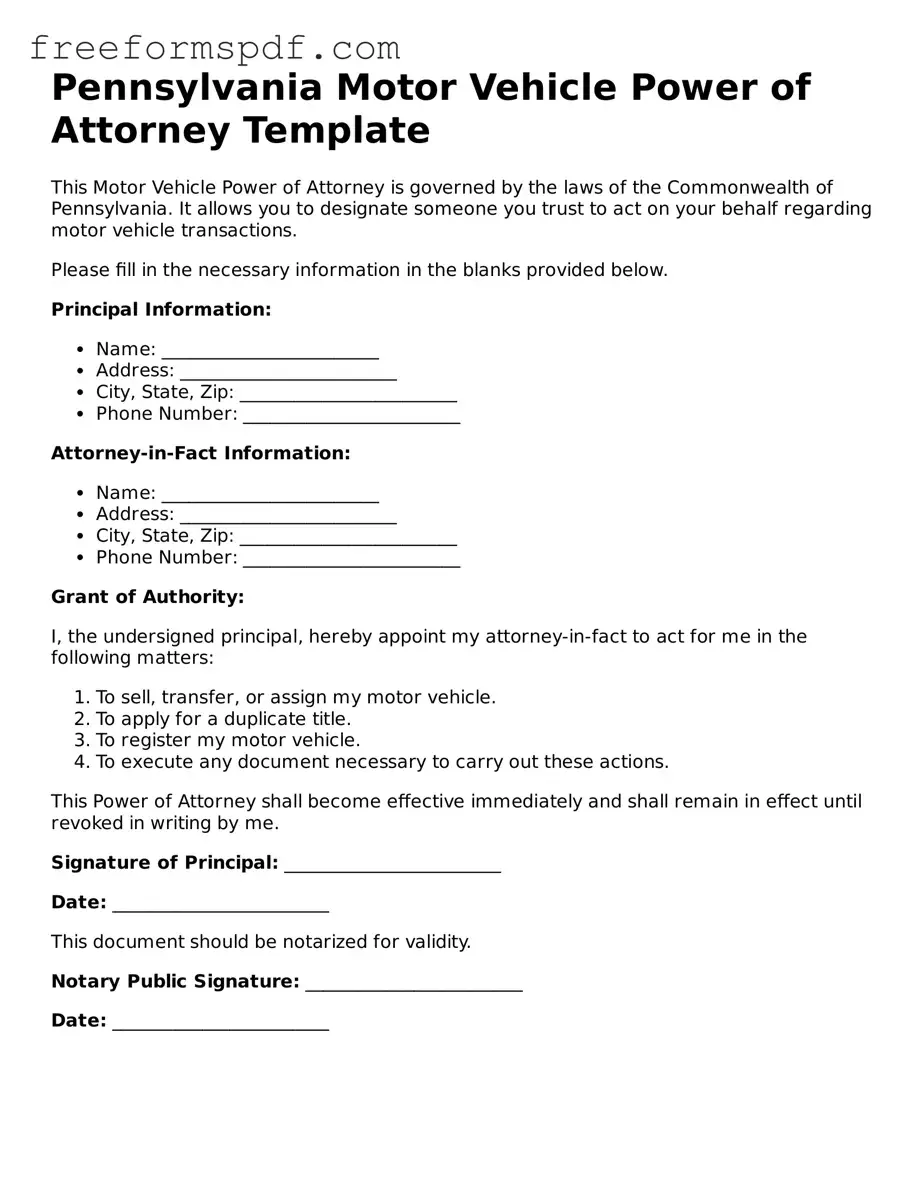Attorney-Verified Motor Vehicle Power of Attorney Document for Pennsylvania State
Common mistakes
-
Not including the full name of the principal. The principal's name must be complete and match their identification documents.
-
Failing to provide the correct vehicle information. This includes the vehicle's make, model, year, and VIN.
-
Omitting the name of the agent. The agent’s name must be clearly stated to avoid confusion about who is authorized to act.
-
Using an outdated version of the form. Always ensure that you are using the most current version of the Power of Attorney form.
-
Not signing the form. The principal must sign the document for it to be valid.
-
Neglecting to have the form notarized. In Pennsylvania, notarization is often required to validate the Power of Attorney.
-
Failing to specify the powers granted. Clearly outline what the agent is authorized to do regarding the vehicle.
-
Leaving out the date. Including the date of signing is crucial for establishing the validity period of the Power of Attorney.
-
Not providing copies to relevant parties. Ensure that all necessary parties receive a copy of the signed document.
-
Overlooking state-specific requirements. Familiarize yourself with any additional requirements specific to Pennsylvania.
Learn More on This Form
-
What is a Pennsylvania Motor Vehicle Power of Attorney form?
The Pennsylvania Motor Vehicle Power of Attorney form is a legal document that allows an individual (the principal) to appoint another person (the agent) to act on their behalf regarding motor vehicle transactions. This can include tasks such as transferring vehicle ownership, registering a vehicle, or obtaining a duplicate title.
-
Who can be appointed as an agent?
Any competent adult can be appointed as an agent. This includes family members, friends, or professionals such as attorneys. It is important that the principal trusts the agent, as they will have the authority to make decisions regarding the principal's motor vehicle matters.
-
How do I complete the form?
To complete the Pennsylvania Motor Vehicle Power of Attorney form, the principal must fill in their personal information, including name and address. The agent's information must also be provided. The form should be signed and dated by the principal in the presence of a notary public to ensure its validity. It is essential to follow all instructions carefully to avoid any issues.
-
Do I need to file the form with the state?
No, the Pennsylvania Motor Vehicle Power of Attorney form does not need to be filed with the state. However, it is advisable to keep a copy of the signed form for personal records. The agent should present this form when conducting any transactions related to the motor vehicle.
-
Can I revoke the Power of Attorney?
Yes, the principal can revoke the Power of Attorney at any time as long as they are competent to do so. To revoke, the principal should notify the agent in writing and may also wish to complete a formal revocation document. It is crucial to inform any relevant parties, such as the Department of Motor Vehicles, about the revocation to prevent unauthorized actions.
Misconceptions
There are several misconceptions regarding the Pennsylvania Motor Vehicle Power of Attorney form. Understanding these can help individuals navigate the process more effectively.
- Misconception 1: The form is only necessary for selling a vehicle.
- Misconception 2: Only a lawyer can fill out the form.
- Misconception 3: The form must be notarized to be valid.
- Misconception 4: The Power of Attorney is permanent and cannot be revoked.
This is incorrect. While the form is commonly used for vehicle sales, it can also be utilized for other transactions, such as transferring ownership, registering a vehicle, or handling title issues.
This is not true. Any individual can complete the form as long as they provide accurate information and follow the instructions. However, seeking legal advice can be beneficial for complex situations.
This is false. The principal can revoke the Power of Attorney at any time, as long as they are mentally competent. A written notice of revocation should be provided to the agent and any relevant parties.
Some Other Motor Vehicle Power of Attorney State Templates
Dmv Power of Attorney Oregon - This serves as a formal method to transfer vehicle operation authority to another individual.
Odometer Disclosure Statement Washington - It streamlines vehicle-related authorizations, benefiting both the owner and the agent.
Power of Attorney Motor Vehicle - Ensures a designated person can manage vehicle affairs smoothly.
To streamline the rental process and ensure all necessary information is collected, landlords can utilize resources such as the NY Templates, which provide templates for the Nyc Apartment Registration Form that comply with local regulations.
Vsa 70 - The document simplifies processes for individuals who may be unable to attend to vehicle paperwork in person.
